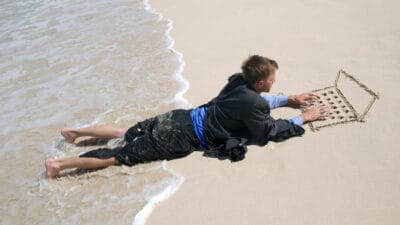COVID-19 lockdowns in Sydney, Perth and south-east Queensland will cost Australia $2.5 billion, but could actually be a boon to the ASX share market.
That's the opinion of AMP Capital chief economist Shane Oliver, who thought Australia really has no choice but to keep enduring lockdowns until the majority of the population is vaccinated.
"Australia's approach has led to relatively less deaths and a stronger economy," he said in a AMP Ltd (ASX: AMP) memo this week.
"And being early in the vaccination process – both globally and in Australia – it's still too early to simply relax controls."
Oliver calculated that, with greater Sydney hosting about 6.6 million people and roughly 25% of the national GDP, the 2-week lockdown there would be a $2 billion hit to the economy.
Perth's shorter shutdown would be $200 million and Queensland's 3-day freeze would cost $300 million.
That $2.5 billion total doesn't include Victoria's fortnight-long lockdown starting last month, which was an estimated $1.5 billion blow to the economy.
COVID-19 lockdowns work: for health and economy
According to Oliver, early and snappy lockdowns work well to keep people healthy and minimise damage to the economy.
"'A stitch in time saves nine' as the old saying goes!" he said.
"Providing they are short, the economic impact is relatively 'minor' — although still horrible — as spending and economic activity is delayed, which then bounces back once the lockdown ends."
According to Oliver, countries that had a less stringent health approach, like the US and Sweden, ended up suffering more deaths and a worse economy.
"If Australia had a laxer approach, and as a result had the same per capita deaths as the US, it would have lost an extra 47,000 Australians on top of the 910 deaths so far," he said.
"More deaths and a worse economy do not strike me as a compelling case to avoid lockdowns."
Lockdowns could be a major boost for stocks
Oliver pointed out that the current COVID-19 outbreak could have a positive side-effect for ASX investors.
"The ongoing threat posed by coronavirus and lockdowns will likely keep the RBA relatively dovish at its July meeting," he said.
"While we expect it to stick to the April 2024 bond for its yield target and announce some tapering of its bond buying, it's likely to reiterate that rate hikes remain a long way off."
In addition, the current wave of the virus would probably "limit the upside in bond yields in the short term", making shares more attractive as an investment choice.
The spread of the virus, Oliver admitted, could be a catalyst for a "near-term correction" in the share market, especially for cyclical stocks.
"But if snap lockdowns remain relatively short as we expect, they are unlikely to derail the Australian economic recovery or the rising trend in Australian shares."









